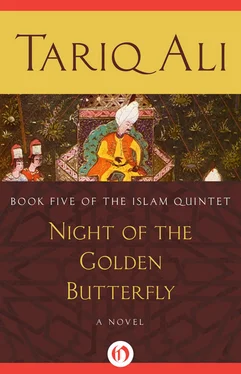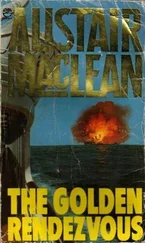‘I’m returning to Paris soon. It’s irritating never to leave the house without a maid. These two are well trained. One was married to the peasant who replaced the candle, but he died a few weeks ago.’
I felt keenly aware that our relationship was about to undergo another change.
At five in the morning, the maids woke us up, helped me dress and returned me to my official quarters. Fifteen minutes later the muezzin called the faithful to prayer, but old Great-Uncle didn’t stir a muscle. Two hours later we were all having breakfast.
AT NINE FORTY-FIVE WE moved to the big hall, an unusual structure that stood on its own, at a slight distance from the old house and the new additions. It had originally been built as a covered market so that the horse dealing took place in the shade and the animals could be thoroughly inspected before being bought or sold. Improvements in keeping with its later function had been made in the nineteenth century. Beasts of a different sort assembled here now. Local landlords, usually men of harsh and violent temperament, met here regularly to discuss common preoccupations, mainly brigandage of various sorts that was supposedly plaguing the countryside. For many centuries peasant brigands had constituted the only serious opposition to the vile rule of their masters, who had long forgotten that the origins of their own fortunes, as is the case with great families everywhere, lay in theft and pillage on a grand scale.
When these outlaws were caught and punished, ordinary people felt great sympathy for them; songs and ballads about their deeds remain part of Sindhi folklore. They had defied authority, and for that they were honoured. It was rumoured that this hall had briefly been used as an execution, or rather a strangulation, chamber: those caught stealing were brought here and the life was choked out of them. Not all of them were men.
This was also the hall where the landed gentry of the region had met in the nineteenth century and decided that since the British conquerors had occupied Sind with such superior force, any resistance would amount to collective suicide, and their heirs would be punished by being deprived of their property. Thus, it was unanimously agreed, collaboration was the only way forward. Great-Uncle’s grandfather had been the moving force behind the decision. The landed collaborators had prospered. As the British prepared to leave India, they advised their old friends to transfer their loyalties to the Muslim League and the new Fatherland. They did so and continued to prosper.
Such was the historic location where Plato’s last work was going to be revealed to a handful of his friends. We arrived soon after breakfast and began looking at the old photographs that adorned the walls, including a very fetching one of the then-young great-uncle on horseback and attired in polo gear. We were interrupted by the slow march into the space of a team often brawny peasants, five on each side of the huge painting. They carried it in and placed it against the wall. More retainers rushed in to help uncover it. Plato would have found this both amusing and repulsive, but homilies were redundant, for had he been alive we wouldn’t be here and the work would not have existed in its present form. It was the artistic equivalent of his last will and testament.
Zaynab was becoming impatient. ‘Get the paper and cardboard off and open, open. Hurry up.’
Alice had recovered sufficiently to be present, and in case of an emergency there were six toilets attached to the hall — one for each of the big families who convened here in the old days. Zaynab desperately wanted MoMA in New York to host the first exhibition: hence her determination to bring Alice over to Jam Thanda Gosht and her irritation with me for ‘ragging Alice’.
Yu-chih, no doubt wondering why Confucius had dragged her to this place when she could have been sightseeing elsewhere, was trying not to look bored, and failing. The rest of us were impatiently awaiting Plato’s message to the world. Once the cardboard and brown paper had been removed, we saw that it was not one painting at all, but a huge triptych. Each panel was painted in different colours. I insisted that we should see each in turn, with the other two turned temporarily to face the ancestors on the walls.
The first panel was what Zaynab had seen at an early stage. ‘The horror, the horror’ had been her first reaction, and she had fled to Europe thinking that Plato was on the verge of insanity. The ‘horror’ was undoubtedly present as the core of the painting, but it was much changed since those early drafts. This was the Fatherland panel, the one he had told me might trigger an upheaval in the country. The cancers destroying it were painted as living organisms with tentacle-like attachments that were competing with each other to occupy the whole body. I had never seen anything like this before, from Plato or anyone else. It was certainly original. The colours used to paint the cancers were strange combinations of blood red and pus yellow, but each was given individual features.
Zaynab wanted me to explain each section in turn, though Plato’s message was clear enough. ‘It may be tedious but it’s necessary’, she had insisted the night before, ‘in order for Alice to fully understand the complexity of the painting.’
Ally only knew the young Plato’s work, which was not difficult to understand, not even the folio of 1964 etchings. So, I complied — as I usually did with Zaynab’s demands. The first panel, I said, could simply be titled ‘The Four Cancers of Fatherland’. These were lurid and surreal depictions. No subtleties, no mysteries to explain here. Plato loved leaving clues in his obscurer work, but had not bothered with any in this panel. The malignant cancer that had sprouted three siblings was shaped like an eagle. Stars and stripes in a state of cancerous decay were tattooed on the back of an Uncle Sam, like so many welts. The face of Uncle, watching the eagle with an approving smile, was unmistakable. It was Barack Hussein Obama, the first dark-skinned leader of the Great Society. The newest imperial chieftain was wearing a button: ‘Yes we can… still destroy countries’. Plato’s image was designed to be crude, I thought, but was it accurate? Alice had become nervous and fidgety as she scribbled furiously in her notepad, a clear indication that the arrow had hit the mark.
Was this the first critical entry by the art world? I could hear the sycophants hard at work reassuring liberal opinion that Plato could be safely ignored. He was a marginal painter, not a celebrity with over twenty prizes to his name. I. M. Malik was a much greater and more important artist from that country and was already working on a portrait depicting the president as Saint George fighting an Islamist dragon breathing mushroom clouds. Commissioned by a private collector, it had already been booked into seven museums on the strength of the idea and Malik’s formidable reputation. But which painting would last? This is a question usually avoided by toadies, who can only live in and for the present so as never to be on the wrong side of history. Adept at sniffing power in every sphere, which is part of their trade, they shift effortlessly from one posterior to another. Plato had nothing to fear from their judgement.
The second cancer, painted in blood red and khaki, appeared to be saluting the first. Or was that simply my imagination? I moved back. I was right. He had not wasted much time on Fatherland’s army and had painted the dictators it had given the country in garish colours. They were devouring bits of the dying country as if keeping the chemotherapy at bay. That must have been in Plato’s mind, though not everyone present accepted my interpretation. Zahid thought it was far-fetched, but Alice and Zaynab agreed with me. One of the despots was crumbling and different bits of metastasizing material were floating in the air. The chemo had disintegrated at least one tumour. It was all a bit too much.
Читать дальше












